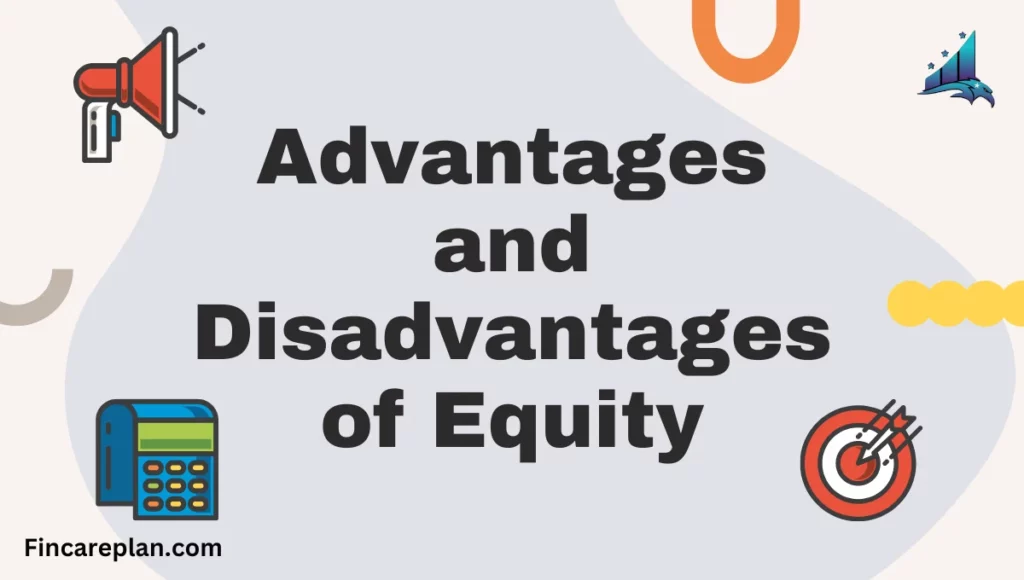Table of Contents
ToggleThe process of raising capital for your business by selling your ownership shares is called Equity financing. So the company voluntarily sells the new shares in exchange for cash investment.
The business receives the money it needs to meet its requirements as well as the investor gains a share of your company. The investor will benefit from the success of your business.
This method helps companies to achieve their short term needs and also supports their long term project for its growth. Let us briefly see the advantages and disadvantages of equity.
Advantages of Equity
1. Debt Free
The major advantage of a company that wants to explore more in business or expand its progress then equity helps a lot without adding debt to your company. There is no need to repay your debt in this method. You may receive more money to develop your business to the next level.
If you take loan financing for your business it may require monthly repayments as well as settlement amounts for years. If you are not eligible to handle this, then the business will go bankrupt. To avoid this you may choose equity financing, by selling your ownership partially to the investors who want to gain profit from your business growth.
2. Shared Risk
The most convenient part of selling your shares to investors is you don’t want to repay the amount that you lost in your business. You are not supposed to pay back your cash for your loss but you may potentially take legal action against your ineligibility to provide the best results for the investor’s money.
Like you, the new investor also trials his investment in hopes of getting good profits. If you are a newbie to start your investment then equity is apt for your risk taking. This seems to be a shared risk of investment from both sides.
So without losing your confidence, you can surely invest your part of the money in the growth of the organisation that shares its ownership partially.
3. Increased Credibility
Your established credit history and financial track record create credibility for your company and for the investor. Your creditworthiness brings more investors to invest their money in the development of your company. This builds a good financial relationship and trust between the Investors and your company.
4. Network and Knowledge
This may form a network with more experienced and knowledgeable individuals who are interested in investing in your company. They will give potential financial ideas to benefit from their knowledge and connections.
5. Use of Funds
The funds can be used for various purposes. You can use it for your business expansion, research and development, or marketing. This can vary to market conditions and use it for growth opportunities. The possibility of follow-on funding also may increase in the future as the business grows.
Disadvantages of Equity
Like many more advantages, equity also has some disadvantages to think of. Let us explain in detail.
1. Partial ownership
You may share your power of control over the company with the investors also. As an investor, they also gain ownership of your company by gaining your company shares.
2. Share dividend
Your investors always expect a piece of profit from your company as dividends. You must pay your investors profit for their part in the growth of the company. Your profits can be shared in the form of dividends to the investors.
However, it could be worth sharing because you are debt free and they give their time and money for the wellness of your organisation. A mutual gain for both sides but you have to share how much you earned as profits.
3. Market Fluctuations
Equity markets are not always stable. The share price goes up and down. The market fluctuation may lower the average price per share of a stock or a bond over some time than it is mentioned in the portfolio over the same period.
This unsteady nature of the equity market may cause losses for investors in unstable conditions. So one must be aware of market fluctuation before investing.
4. Time- Consuming Process
It may consume more time for the process approval due to some legal regulations and compliance. You will have to invest some more time to manage your investors. Other than debt raising, equity funding may cost more time because of its procedures. You have to wait for some time to sell your shares in the equity market.
5. Disclosing Information
You have to provide additional information about your business growth to retain your investors. Sometimes you are forced to consult with your investors in decision making. You need to share confidential information with the investors to maintain transparency in your business development. Investors always look for the transparent and straightforward attitude of the company.
Conclusion
If you are decided to take part in equity funding as a company owner you must take into consideration its advantages and disadvantages. Even though it provides capital for your business growth for short term and long term projects, you must consider a few things like partial ownership, mutual decision making, sharing profit, disclosing confidential information of the company, and time-consuming processes.
You may feel debt free now but you have to share the profit of the company in the form of dividends. If you want to see sustainable growth in your business you must stick on to your financial goals in maintaining equity funds.
